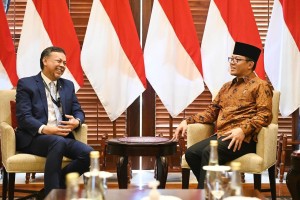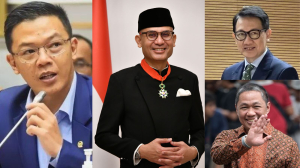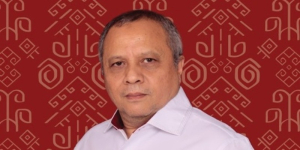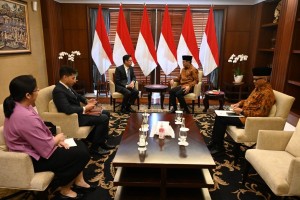Sugiono calls for strengthened ASEAN cooperation against transnational crime
Indonesian Foreign Minister Sugiono called for a strengthened collective ASEAN response to the growing threat of transnational crime in the region in his address at the 29th ASEAN Political-Security Community (APSC) Council Meeting in Kuala Lumpur, Malaysia on Sunday, May 25, 2025.
He commended the implementation progress of the APSC Blueprint 2025, which has reached 99.6 percent, but emphasized the need for ASEAN to remain vigilant in the face of increasingly complex regional security challenges.
“Moving forward, we must focus more on real threats such as transnational crime. This is not just a security issue − it poses a serious threat to the very process of ASEAN community-building,” Sugiono said.
To enhance the effectiveness of efforts against transnational crime, the Indonesian foreign minister urged stronger cooperation among ASEAN law enforcement agencies, including joint investigations, information sharing, mutual legal assistance, and the appointment of national focal points to expedite communication and coordinated action. “ASEAN needs a strong, integrated collective response that prioritizes victim protection and effective law enforcement,” he cited.
Beyond security concerns, Sugiono also highlighted the importance of integrating the implementation of the ASEAN Outlook on the Indo-Pacific (AOIP) into the APSC pillar.
“AOIP must serve as a unifying framework and foster cross-pillar and cross-sectoral collaboration,” he said.
In this context, Sugiono encouraged the implementation of the Concept Paper on AOIP from a Defence Perspective, which was adopted by ASEAN in 2023. He urged other ASEAN sectoral bodies to follow this example to ensure AOIP is fully mainstreamed into the APSC Strategic Plan in alignment with the ASEAN Community Vision 2045.
The APSC Council Meeting is a high-level forum of ASEAN Political-Security Ministers that sets the strategic direction of regional cooperation under the political-security pillar. During the meeting, the ASEAN Political-Security Community Council Report and the APSC Strategic Plan were officially adopted.
ASEAN’s credibility
Previously, Sugiono underscored the need for greater ASEAN unity and credibility amid rising geopolitical tensions and global economic fragmentation during the ASEAN Foreign Ministers’ Meeting (AMM) held in Kuala Lumpur ahead of the 46th ASEAN Summit.
Speaking at the Kuala Lumpur Convention Center, he stressed that ASEAN’s credibility hinges on its ability to safeguard peace and stability in the region. He emphasized the importance of strengthening ASEAN’s cohesion to effectively respond to global challenges.
Sugiono called for a renewed commitment to the Treaty of Amity and Cooperation (TAC), which he described as the cornerstone of ASEAN’s peace architecture. He urged ASEAN to take substantive rather than procedural steps, especially in light of TAC’s upcoming 50th anniversary next year.
On ASEAN’s external relations, Sugiono reiterated the importance of maintaining ASEAN centrality and relevance amidst numerous external partnership initiatives. Indonesia advocated for the adoption of the ASEAN Decision on Enhancing Relations with External Partners, which aims to guide ASEAN’s engagement with its dialogue partners.
“ASEAN needs focused partnerships that remain within the ASEAN-led framework,” he said.
Addressing Timor-Leste’s bid for full ASEAN membership, Sugiono reaffirmed Indonesia’s strong support for the adoption of guidelines to facilitate Timor-Leste’s accession to ASEAN’s legal instruments. He praised Timor-Leste’s progress and called for a practical, supportive, and accelerated integration process. “This journey must not be obstructed,” he said, calling on ASEAN member states to provide sustained technical assistance.
Regarding the ongoing crisis in Myanmar, he warned that inaction would come at a high cost to regional stability. He urged ASEAN to take steps to end violence and create conditions for inclusive dialogue. “We must act in unity to help Myanmar achieve peace – one that is Myanmar-led and Myanmar-owned,” he concluded.
The AMM was attended by ASEAN foreign ministers, the ASEAN Secretary-General, and a representative from Timor-Leste. Myanmar was represented by a non-political representative. The meeting also resulted in the adoption of the Addendum to the Southeast Asia Nuclear Weapon-Free Zone (SEANWFZ) Treaty.
Already have an account? Sign In
-
Start reading
Freemium
-
Monthly Subscription
20% OFF$29.75
$37.19/MonthCancel anytime
This offer is open to all new subscribers!
Subscribe now -
Yearly Subscription
33% OFF$228.13
$340.5/YearCancel anytime
This offer is open to all new subscribers!
Subscribe now







